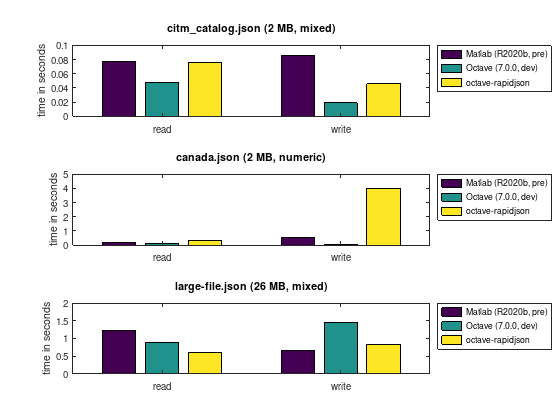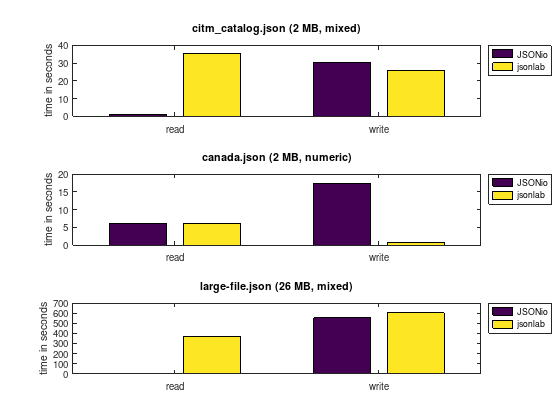Support for the JSON data format after GSoC 2020#
Created: 2020-11-23
The Google Summer of Code (GSoC) 2020
is over and I had the pleasure to mentor
Abdallah Elshamy,
who enriched Octave with the jsondecode() and jsonencode() functions.
A remaining issue was the translation of the Octave function
matlab.lang.makeValidName
to the C++ language.
This is now accomplished and the overall results are great.
See the previous benchmark of this Jupyter Notebook (August 19, 2020) with
matlab.lang.makeValidNameas Octave code.
Again a larger JSON data set was used, with test cases collected from the excellent nativejson-benchmark, but with focus on Octave.
Only the running times for reading and writing JSON data are regarded in this benchmark. Another test by Abdallah has been carried out in June to test the compatibility for Matlab.
The test environment is a laptop with
16 GB of main memory
OpenSUSE 15.2 Linux
Octave version as given below
octave_version = version ()
octave_hg_id = version ('-hgid')
octave_version = 7.0.0
octave_hg_id = 38e22065d9ec
The following JSON extensions for Octave are under test.
name |
description |
|---|---|
Based on RapidJSON, reading DOM API. |
|
Based on RapidJSON, reading SAX API. |
|
Based on RapidJSON, reading DOM API, writing m-file. |
|
Based on JSMN, writing m-file. |
|
m-file only |
The JSON test files are described in the following table.
name |
size (byte) |
description |
|---|---|---|
1,727,204 |
Structured data with mixed text and numeric. |
|
2,251,060 |
Numeric data set in GeoJSON format. |
|
26,141,343 |
Structured data with mixed text and numeric. |
Benchmark setup#
Create a directory to keep track of the mess.
mkdir ('benchmark');
cd ('benchmark');
Load the benchmark JSON files.
if (exist ('citm_catalog.json', 'file') ~= 2)
urlwrite ( ...
'https://github.com/RichardHightower/json-parsers-benchmark/raw/master/data/citm_catalog.json', ...
'citm_catalog.json');
end
if (exist ('canada.json', 'file') ~= 2)
urlwrite ( ...
'https://github.com/mloskot/json_benchmark/raw/master/data/canada.json', ...
'canada.json');
end
if (exist ('large-file.json', 'file') ~= 2)
urlwrite ( ...
'https://github.com/json-iterator/test-data/raw/master/large-file.json', ...
'large-file.json');
end
Setup octave-rapidjson.
if (exist ('octave-rapidjson', 'dir') == 0)
urlwrite ( ...
'https://github.com/Andy1978/octave-rapidjson/archive/2d88511712032b14dea4c2272d82249e7547772a.zip', ...
'octave-rapidjson.zip');
unzip ('octave-rapidjson.zip');
rename ('octave-rapidjson-2d88511712032b14dea4c2272d82249e7547772a', ...
'octave-rapidjson');
cd ('octave-rapidjson')
urlwrite ( ...
'https://github.com/Tencent/rapidjson/archive/35e480fc4ddf4ec4f7ad34d96353eef0aabf002d.zip', ...
'rapidjson.zip');
unzip ('rapidjson.zip');
rename ('rapidjson-35e480fc4ddf4ec4f7ad34d96353eef0aabf002d', 'rapidjson');
mkoctfile -Wall -Wextra -I./rapidjson/include load_json.cc
mkoctfile -Wall -Wextra -I./rapidjson/include save_json.cc
cd ('..')
end
Setup octave-jsonstuff.
if (isempty (pkg ('list', 'jsonstuff')))
pkg install https://github.com/apjanke/octave-jsonstuff/releases/download/v0.3.3/jsonstuff-0.3.3.tar.gz
end
Setup JSONio.
if (exist ('JSONio', 'dir') == 0)
urlwrite ( ...
'https://github.com/gllmflndn/JSONio/archive/6c699a315ac2c578864d8b740a061bff47b718bf.zip', ...
'JSONio.zip');
unzip ('JSONio.zip');
rename ('JSONio-6c699a315ac2c578864d8b740a061bff47b718bf', 'JSONio');
cd ('JSONio')
mkoctfile --mex jsonread.c jsmn.c -DJSMN_PARENT_LINKS
cd ('..')
end
Setup jsonlab.
if (exist ('jsonlab', 'dir') == 0)
urlwrite ( ...
'https://github.com/fangq/jsonlab/archive/d0fb684bd43165d312063345bdb795b628b2c679.zip', ...
'jsonlab.zip');
unzip ('jsonlab.zip');
rename ('jsonlab-d0fb684bd43165d312063345bdb795b628b2c679', 'jsonlab');
end
Benchmark run#
The benchmark function reads the respective JSON file into a string and calls the libraries reading and writing function.
function t = benchmark (json_read_fcn, json_write_fcn)
test_files = {'citm_catalog.json', 'canada.json', 'large-file.json'};
N = length (test_files);
t = nan (N, 2);
for i = 1:N
json_str = fileread (test_files{i});
tic ();
octave_obj = json_read_fcn (json_str);
t(i,1) = toc ();
tic ();
json_str2 = json_write_fcn (octave_obj);
t(i,2) = toc ();
end
end
The results for the Matlab (R2020b, prerelease) have been measured on the same system without JupyterLab.
t.matlab = [
0.0768, 0.0853;
0.1510, 0.5405;
1.2222, 0.6521];
Octave (7.0.0, development version)
t.octave = benchmark (@jsondecode, @jsonencode);
octave-rapidjson
addpath ('octave-rapidjson')
t.rapid_json = benchmark (@load_json, @save_json);
rmpath ('octave-rapidjson')
octave-jsonstuff: No results due to an error.
%pkg load jsonstuff
%t.jsonstuff = benchmark (@jsondecode, @jsonencode);
%error: cat: field names mismatch in concatenating structs
%error: called from
% jsondecode>condense_decoded_json_recursive at line 116 column 9
% jsondecode>condense_decoded_json at line 67 column 7
% jsondecode at line 63 column 7
% benchmark at line 8 column 16
%pkg unload jsonstuff
JSONio: Because of the long running time, the results of the first run are saved here.
addpath ('JSONio')
%t.jsonio = benchmark (@jsonread, @jsonwrite);
t.jsonio = [ ...
0.9583, 30.5410;
6.1333, 17.4022;
4.3382, 552.8929];
rmpath ('JSONio')
Jsonlab: Because of the long running time, the results of the first run are saved here.
addpath ('jsonlab')
%t.jsonlab = benchmark (@loadjson, @savejson);
t.jsonlab = [ ...
35.6242, 26.0625;
6.1303, 0.7365;
372.2456, 601.5318];
rmpath ('jsonlab')
Benchmark results#
graphics_toolkit ('qt')
titles = {'citm\_catalog.json (2 MB, mixed)', ...
'canada.json (2 MB, numeric)', ...
'large-file.json (26 MB, mixed)'};
for i = 1:3
subplot (3, 1, i);
bar ([t.matlab(i,:); t.octave(i,:); t.rapid_json(i,:)]');
legend ({'Matlab (R2020b, pre)', 'Octave (7.0.0, dev)', ...
'octave-rapidjson'}, 'Location', 'bestoutside');
xticklabels({'read','write'});
ylabel ('time in seconds');
title (titles{i});
end

for i = 1:3
subplot (3, 1, i);
bar ([t.jsonio(i,:); t.jsonlab(i,:)]');
legend ({'JSONio', 'jsonlab'}, 'Location', 'bestoutside');
xticklabels({'read','write'});
ylabel ('time in seconds');
title (titles{i});
end

The first figure compares the running times of Matlab, Octave, and octave-rapidjson. Both Octave and octave-rapidjson are based on RapidJSON and perform in many cases better than the Matlab implementation.
octave-rapidjson is using the SAX API of RapidJSON, while the new Octave implementation uses the DOM API. This decision was made to achieve best compatibility to Matlab, which was in some cases difficult with the SAX API and is no pririty for the octave-rapidjson project. The results show, that both APIs perform similarly in the tested data sets, even though there is a claim, that the SAX API is faster in some cases.
The results of JSONio and jsonlab are split into a second figure, as the running times are significantly larger than those of the first figure. For octave-jsonstuff we could due to an error not obtain any results and the maintainer is informed about it.
